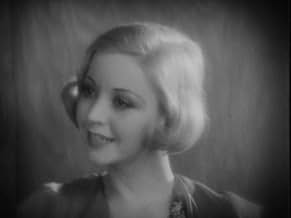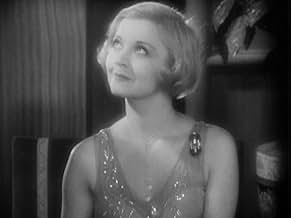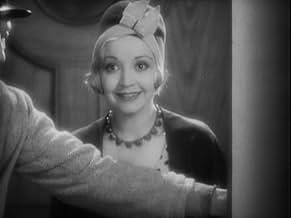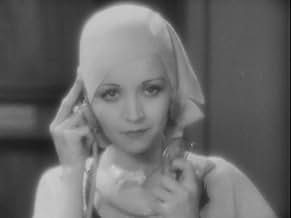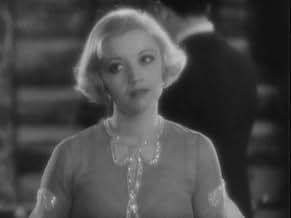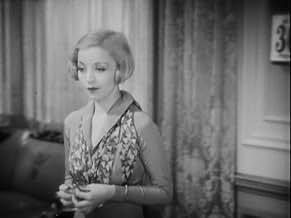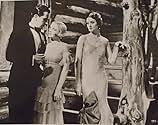Kay Elliott corteja al abogado Alan Ward mientras rechaza a los cazafortunas John y su codiciosa hermana, con el objetivo de socavar sus ambiciones amorosas.Kay Elliott corteja al abogado Alan Ward mientras rechaza a los cazafortunas John y su codiciosa hermana, con el objetivo de socavar sus ambiciones amorosas.Kay Elliott corteja al abogado Alan Ward mientras rechaza a los cazafortunas John y su codiciosa hermana, con el objetivo de socavar sus ambiciones amorosas.
- Dirección
- Guión
- Reparto principal
Sayre Dearing
- Kay's Friend
- (sin acreditar)
Geraldine Dvorak
- Party Guest
- (sin acreditar)
Jay Eaton
- Party Guest
- (sin acreditar)
Adolph Faylauer
- Party Guest
- (sin acreditar)
Dick Gordon
- Party Guest
- (sin acreditar)
Thelma Hill
- Friend
- (sin acreditar)
Lloyd Ingraham
- Judge Drake
- (sin acreditar)
Jane Keckley
- Office Cleaning Woman
- (sin acreditar)
Fred Kelsey
- Policeman
- (sin acreditar)
Marian Marsh
- Kay's Friend
- (sin acreditar)
Reseñas destacadas
This is a small film and isn't really about much more than a bunch of spoiled rich kids finding out that there is more to life than just being minor league juvenile delinquents. But there are a number of things that make this charming and fun and it's under an hour long so there's not much to lose.
First of all, as many have said, Alice White is such a quintessential flapper that it's no wonder she didn't last beyond the Clara Bow years. Her New Joisey oops Jersey accent is a hoot and different from that of the great prima donna actresses of the era. There is a sequence early in the film where she bats her eyes at Paul Page while riding in a car and she more than bats them. Her eyes are so enormous and dominant that they practically do cartwheels flirting with him. In short, as a male, I find her irresistibly cute and delightful and her firm, clear delivery of lines (essential in early talkies for theaters with not so great sound systems) stands out with the sharpness of a female Eddie Cantor.
Watch also for the barely seen singing group at the big party where microphones are not yet de rigeur and the ensemble sings through megaphones! The flapper clothes are all wonderful and so are the beautiful cars so if you like period fun this is a delight. Myrna Loy is still in her bad girl period here and makes a nasty femme fatale. Paul Page is a Frederic March clone as a leading man and shows naturalness and real talent. Too bad his career simply faded away after 1934.
There's nothing super spectacular here but either you find Alice White doing her naughty flirting is as they used to say "the bee's knees" or you don't. It's easy to underestimate the way she uses her eyes, her body language and her desire to get the most out of every scrap of dialogue she gets. I'm so sorry she had such a fall from grace and a difficult later life but she has become a cult figure for movie buffs who love the early talkies.
I just wanted to see this film because of Myrna Loy. I love Myrna Loy. But Myrna doesn't have much to do in this film. Most of the spotlight is on little, vivacious, cute Alice White. I became a fan of her. She's the ultimate flapper. She reminds you of a Clara Bow or Toby Wing. She's very natural- even though many say she didn't like talkies and feel uncomfortable. She didn't seem like it. This is a pre-code picture about a flirtatious woman which is played by Alice White who makes bet too see which guys she can hook, line, and sinker. But with one of the guys she ends up falling in love. Myrna Loy in this picture is coming into her own trademark acting in this film. Her aloof, snotty, sophisticated comedy/acting would be noticed and loved not along after this picture. If you can find it, you'll treasure it.
Spoiled rich girl Kay Elliott (Alice White) can't settle down, or even settle on one guy. In Naughty Flirt, she battles with Alan Ward (Paul Page -only made a few films) and Linda Gregory (Myrna Loy, three years before the Thin Man series) Alice White made many films, but none seem to be well known. She had been in the original, silent "Gentlemen Prefer Blondes" 1928. White appeared in more than her share of movies with suggestive names (Naughty Baby, Hot Stuff, Lingerie, Playing Around) This is a good story, but you can tell it was made just as sound was coming in play - they were heavy on the eye makeup, and they even use subtitle cards several times. Also a music track playing under most of the dialogue. Keep an eye out for Fred Kelsey as the cop at the beginning - made a career out of playing the policeman (the Man Who Came to Dinner, Larceny Inc, the Bride Walks Out)
This was flapper Alice White's last starring role at Warner Brothers as the roaring twenties have ceased to roar and the Great Depression rolls in. This seems to be, in fact, the roaring twenties' last hurrah a year out from that decade.
Alice White plays rich spoiled party girl Kay Elliott who pals around with a likewise rich partying crowd. One night she and her friends are arrested for disorderly conduct and taken to night court. There young attorney Alan Ward is observing the proceedings of the night court as part of his own continuing education when Kay and her friends are brought in. The judge gives Kay a small fine, and then she is about to marry fellow idler Jack Gregory when Alan intervenes and whisks her away. This is partly because he is attracted to her and partly because he works for Kay's dad and doesn't want her to make a big mistake. Gregory is upset about this for more reason than just love - he and his sister (Myrna Loy) are broke, and they want to get their hands on the Gregory millions. Complications ensue.
The reason to watch this is not the plot, although it was better than I anticipated, or the acting - the only person in the cast who will have an acting career in three years will be Myrna Loy, and she is very much supporting cast here. It is all of the things that were so very Jazz Age or just plain obsolete that show up here - ink wells, dictaphones with cylinders, the ubiquitous fox stoles and cloche hats, and men wearing tuxedos at every public event.
This is also the death rattle of the Vitaphone sound on disc system. Cameras could not move when using Vitaphone, so everything is a series of still shots. But sometimes the director would want motion or want a distance shot. For example, at one point Alan Ward is retiring for the night and there is a long tracking shot that takes the camera from down the hall up to Ward. He is heard singing from a distance, but his lips are not moving! That was because, to get this shot, silent film had to be used and in that case it was improperly done. There are other such shots and those are made with peoples' heads turned so that you cannot see their mouths move out of sync with obviously dubbed conversation.
It's all a very light and airy confection and I'd recommend it, especially if you are a film history buff.
Alice White plays rich spoiled party girl Kay Elliott who pals around with a likewise rich partying crowd. One night she and her friends are arrested for disorderly conduct and taken to night court. There young attorney Alan Ward is observing the proceedings of the night court as part of his own continuing education when Kay and her friends are brought in. The judge gives Kay a small fine, and then she is about to marry fellow idler Jack Gregory when Alan intervenes and whisks her away. This is partly because he is attracted to her and partly because he works for Kay's dad and doesn't want her to make a big mistake. Gregory is upset about this for more reason than just love - he and his sister (Myrna Loy) are broke, and they want to get their hands on the Gregory millions. Complications ensue.
The reason to watch this is not the plot, although it was better than I anticipated, or the acting - the only person in the cast who will have an acting career in three years will be Myrna Loy, and she is very much supporting cast here. It is all of the things that were so very Jazz Age or just plain obsolete that show up here - ink wells, dictaphones with cylinders, the ubiquitous fox stoles and cloche hats, and men wearing tuxedos at every public event.
This is also the death rattle of the Vitaphone sound on disc system. Cameras could not move when using Vitaphone, so everything is a series of still shots. But sometimes the director would want motion or want a distance shot. For example, at one point Alan Ward is retiring for the night and there is a long tracking shot that takes the camera from down the hall up to Ward. He is heard singing from a distance, but his lips are not moving! That was because, to get this shot, silent film had to be used and in that case it was improperly done. There are other such shots and those are made with peoples' heads turned so that you cannot see their mouths move out of sync with obviously dubbed conversation.
It's all a very light and airy confection and I'd recommend it, especially if you are a film history buff.
Alice White was an adorable flapper, whose career was over before it started. She was First National's answer to Clara Bow but she didn't have the longevity of the red headed "It" girl. 1931 started with "The Naughty Flirt", one of her best films and ended with "Murder at Midnight", in which, although billed prominently, she was only given about two decent scenes.
The plot is 60 minutes of frivolous fun with White doing what she does best - being adorably flirty and making every man her slave. When Kay (Alice White) and her gang are hauled into night court for disorderly conduct, she meets Alan Ward (Paul Page) an associate with her father's law firm and it doesn't take him long to fall under her spell. She already has a persistent suitor in Jack Gregory (Douglas Gilmore) who is always asking Kay to marry him. He, along with his scheming sister, Linda (Myrna Loy) have ulterior motives - they have been wiped out in the stock market crash and hope that if Jack can marry Kay their financial worries will be at an end.
The "Cinderella Dance" is one of the film's highlights - all the girls take off one of their shoes, put it in the middle of the ballroom and then the boys have to pick one and dance with it's owner. White, who made her name with a couple of excellent musicals from the early talkie era ("Broadway Babies" (1929) and "Show Girl in Hollywood" (1930)) is not asked to sing or dance here which is a pity. She also gets a run for her money from Myrna Loy as the sultry Linda. Why it took so long for Loy to "make it" (1933's "Animal Kingdom" was her big break) is one of Hollywood's real mysteries. However White's cutie pie acting wins through - she is impossible to resist.
Although she had a very hectic private life, maybe what happened to Alice White were films like "The Naughty Flirt". 1931 was one of the worst years of the depression and with a title like "The Naughty Flirt", reminiscent of a jazzy, carefree past, the movie going public may have been turned off. In this year of unemployment and breadlines, if films started out with scenes of high living ("Bad Company" and "Dance Fools, Dance") audiences wanted to see stars really suffer before realising that the simple life was the best.
Highly Recommended.
The plot is 60 minutes of frivolous fun with White doing what she does best - being adorably flirty and making every man her slave. When Kay (Alice White) and her gang are hauled into night court for disorderly conduct, she meets Alan Ward (Paul Page) an associate with her father's law firm and it doesn't take him long to fall under her spell. She already has a persistent suitor in Jack Gregory (Douglas Gilmore) who is always asking Kay to marry him. He, along with his scheming sister, Linda (Myrna Loy) have ulterior motives - they have been wiped out in the stock market crash and hope that if Jack can marry Kay their financial worries will be at an end.
The "Cinderella Dance" is one of the film's highlights - all the girls take off one of their shoes, put it in the middle of the ballroom and then the boys have to pick one and dance with it's owner. White, who made her name with a couple of excellent musicals from the early talkie era ("Broadway Babies" (1929) and "Show Girl in Hollywood" (1930)) is not asked to sing or dance here which is a pity. She also gets a run for her money from Myrna Loy as the sultry Linda. Why it took so long for Loy to "make it" (1933's "Animal Kingdom" was her big break) is one of Hollywood's real mysteries. However White's cutie pie acting wins through - she is impossible to resist.
Although she had a very hectic private life, maybe what happened to Alice White were films like "The Naughty Flirt". 1931 was one of the worst years of the depression and with a title like "The Naughty Flirt", reminiscent of a jazzy, carefree past, the movie going public may have been turned off. In this year of unemployment and breadlines, if films started out with scenes of high living ("Bad Company" and "Dance Fools, Dance") audiences wanted to see stars really suffer before realising that the simple life was the best.
Highly Recommended.
¿Sabías que...?
- CuriosidadesMyrna Loy's last film at Warner Brothers before moving on to 20th Century-Fox and finally MGM.
- Citas
Invitation: Miss Kay Elliott / requests the honor of your presence / at an informal party given / in Honor of her Annual Expulsion / from Miss Baynor's Select School / for Young Ladies // Embassy Roof / Saturday May third / ten P. M. until?---
- Banda sonoraUntitled Song
(uncredited)
Composer unknown (probably Sam H. Stept)
Played during the opening credits and often as background music
Played as dance music at the country club and sung ("I often wonder if you cared ...") by an unidentified trio
Hummed by Paul Page
Selecciones populares
Inicia sesión para calificar y añadir a tu lista para recibir recomendaciones personalizadas
Detalles
- Duración
- 56min
- Color
Contribuir a esta página
Sugerir un cambio o añadir el contenido que falta

